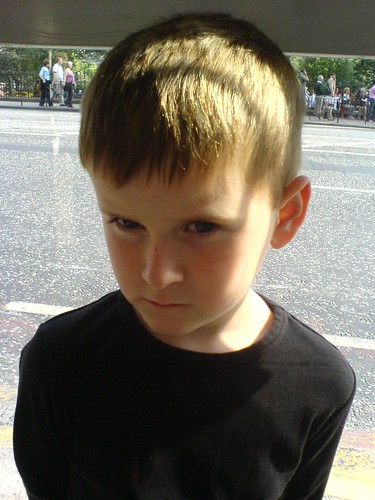For the third time in less than three years, Alex spent his first day in a new school yesterday.
Take One
The first time, he was a five year old in a necktie, starting Primary 1 at Gilmerton Primary School in Edinburgh.
He loved his time at Gilmerton, though we didn’t fit into the primarily working-class community. We also had occasional differences with the school administration, but we kept them away from Alex. He learned to read that year, and discovered a real love of maths. But he knew that he wasn’t going to stay; we were up front with him that we were moving to the Netherlands after that first year.
Take Two
The second time was last autumn, when he started school here in Holland*. We weren’t sure how we were going to handle this, since he came here speaking virtually no Dutch at all. After discussions with the schools in our area, we found ourselves with two choices:
- Drop Alex back a year to playschool-type schooling in the local village school, so that he could spend the time working on his language skills. All being well, he could then skip a grade and be back with his contemporaries. The American family† in the village did this with their eldest a year before we arrived, and found it a successful strategy. Unfortunately, we knew that Alex would be bored senseless by a return to playschool after a year of sit-down learning.
- Put Alex into a school a little further away that specializes in teaching foreign children Dutch in a year, while continuing their ordinary education. (Kind of the reverse of an international school, basically.) Demographically, the school is very different than our village, drawing much of its student body from people who live in the city.
We chose Option 2, and Alex had a fairly intimidating first day at the Kernschool last autumn. He’s a trouper, though, and plunged in wholeheartedly. He worried a lot at first, unsure if he was learning well enough or fast enough, but found his feet academically after the first term. But he never settled socially, making few friends and struggling with the fairly rough and tumble school culture. He has, however, learned a lot of Dutch, and is about half a year ahead of his age group in maths.
Take Three
The Kernschool’s program is designed to slipstream the children into their local schools, once they have the language skills to cope. This meshes well with the local school’s program of settling new children in with their class groups before the summer vacation. So yesterday, Alex went to the village school for the first time, for a half day of sitting with next year’s classmates. (Wednesdays are short days in Dutch schools).
He was nervous before he went in, worrying about his hair and his appearance. I helped him peer into Fiona’s classroom as we went to his (she had no special Dutch training, but started school normally in January; youth is an indisputable advantage to language learning). When he went into the room and his teacher began to speak Dutch to him, I felt a lurch: I didn’t follow everything she said to him. But he did, having already surpassed me in learning the language.
Apparently, he came out triumphant and ecstatic, declaring the new school “super cool”. He liked his classmates, enjoyed the academic work, and had no trouble talking his teacher’s ear off in Dutch. He can’t wait to start.
And then he woke up at 11:30 at night, desperately missing Scotland. I lay in bed with him for half an hour, talking about homesickness‡ and the delights of the Netherlands.
* Pedantic note: Although Holland is not actually a synonym for the Netherlands, we live in the province of Noord-Holland.
† By this classification, we are the English family in the village. It is really not worth trying to correct this.
‡ A matter close to my mind at the moment, since two of my colleagues went to San Francisco last week. One of them even went across the Bay to meet my parents and see my dad’s printing press. My thoughts were often with them, and the world I had left behind to come to Europe.

